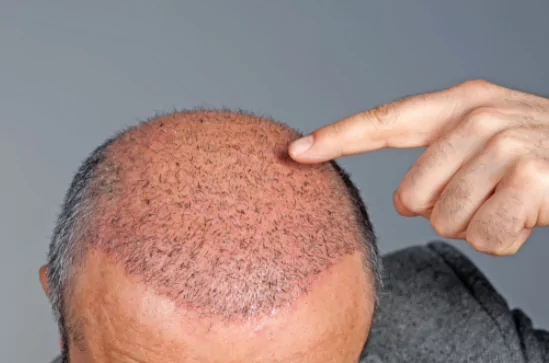Cozmoderm Clinic | Best Dermatology Clinic For Skin and Hair Care In Nagpur
Hair Transplant
Home / Hair Transplant

hair transplant
Hair loss problems can be caused due to several different reasons. While the process is curable and reversible in many cases, there are instances when new hair growth refuses to grow due to permanent damage to follicles and the scalp. These are the situations when Hair Transplant comes to the rescue. Due to modern technology, hair transplant surgery has made hair restoration possible. But, before you opt for a hair transplant one must know which hair transplant treatment is the most suitable for them. There are a lot of different hair transplant surgeries being offered by various different clinics and doctors.
3 Types of Hair Transplant:
• Scalp Reduction:
Scalp reduction is one of the earliest hair transplantation methods. During this process, the scalp from the balding area is surgically removed. Most of the time, the area removed is from the crown or the top of the head. Post removal, the scalp area that bears hair is stretched over to cover and replace the patch that has been removed. The process is suitable mainly for people who have a good quantity of hair on the back and sides of the scalp. Today though, scalp reduction is not often used due to the more advanced FUE and FUT hair transplant procedures.
• Follicular Unit of Hair Transplantation:
FUT stands for Follicular Unit Hair Transplantation are takes place through an intrusive medium. Follicular units are hair groupings as they occur naturally on the scalp and typically contain 1, 2, 3, or 4 hairs. It begins with the doctor cutting a strip of tissue from the scalp, before cutting it into thousands of follicular units. These units are then strategically placed around the head after the doctor has created holes with recipient sites around the affected, bald areas. By means of the removal of a thin strip of scalp from the back of the patient’s head, hair follicles are taken from a donor area that is not susceptible to balding and dissected into individual grafts. They are then transplanted to the balding area of the scalp. As one can probably assume from the above, FUT is a very complicated technique although has the potential for some very fulfilling results.
• Follicular Unit Extraction:
The other method is the FUE method of hair transplantation Follicular Unit Extraction. It involves taking the individual Follicular Unit grafts from the back of the head one by one by cutting around it through a tiny specialized instrument or robotic machine and removing the hair follicles. The process can be tedious and will takes a few hours but is painless after a few numbing injections are given. Once removed from the donor area, the follicular unit is then transplanted.
What happens during a hair transplant?
After thoroughly cleaning your scalp, a surgeon uses a small needle to numb an area of your head with local anesthesia. Two main techniques are used to obtain follicles for transplantation: FUT and FUE.
In follicular unit transplantation (FUT):
- The surgeon will use a scalpel to cut out a strip of scalp skin from the back of the head. The incision is typically several inches long.
- This is then closed with stitches.
- The surgeon next separates the removed portion of the scalp into small sections using a magnifying lens and sharp surgical knife. When implanted, these sections will help achieve natural-looking hair growth.
In follicular unit extraction (FUE) the hair follicles are cut out directly from the back of the head through hundreds to thousands of tiny punch incisions.
- The surgeon makes tiny holes with a blade or needle in the area of your scalp that’s receiving the hair transplant. They gently place hairs in these holes.
- During one treatment session, a surgeon may transplant hundreds or even thousands of hairs.
- After, the graft, gauze, or bandages will cover your scalp for a few days.
A hair transplant session can take four hours or more. Your stitches will be removed about 10 days after surgery. You may require up to three or four sessions to achieve the full head of hair you desire. Sessions occur several months apart to allow each transplant to fully heal.
